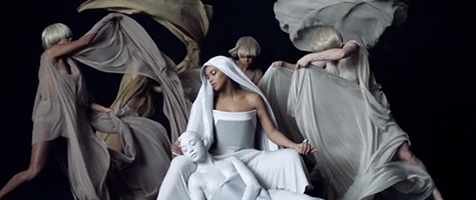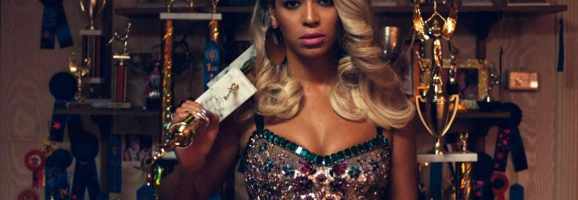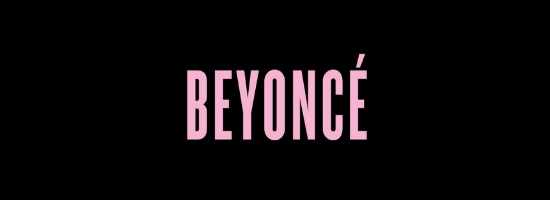Beyoncé’s Visual Album: The Aesthetics of Controversy
Recently, Beyoncé released an unexpected album: Beyoncé. After its release, there has been a few things on the visual album which has or may spark controversy. Such issues range from gender equality to inappropriate religious tones to unauthorized use of auditory samples. The aesthetics of these controversies will be fleshed out by choosing not only visual images, but also auditory images that Beyoncé employs in the album. Since Beyoncé intended every song to have an accompanying visual episode both need to be considered in conjunction with each other.
Although the visuals of Beyoncé are visually striking and for the most part well executed there are some points of controversy within the videos. As all successful art evokes—there are different and perhaps unintended—reactions that the audience has. Some may be positive and others negative, but when does artistic license go too far?
Some images in Beyoncé have conflicting ideas, or unnecessary ones. The visual controversies that I aim to look at are based on six tracks: Mine ft. Drake, Heaven, Pretty Hurts, XO, Flawless ft. Chimamanda Ngozi Adichie, and Drunk in Love ft. Jay-Z.

Mine
As a departure point for discussion, the image of La pietá was used as the second image (right after the burning font “Mine”). Beyoncé harkens to the sculpture by dressing up as the Virgin Mary revered in Catholicism. She is holding what appears to be a boy lying on the ground, completely white, and sleeping or possibly dead. For those who know this sculpture made by Michelangelo Buonarroti, this is a very significant event in all of Christianity. Jesus has just died and the Virgin Mary weeps for her dead son after his crucifixion. This striking image is also accompanied by various dancers twirling in a frenzy of silk.
This background information is crucial in order to understand why this image is controversial especially to the Christian audience. Those who know of this event in Christianity wonder why the image was even brought forth in a song that is about possession of someone Beyoncé does not want to lose. Throughout the song “You’re mine, you’re mine” is sung, but what does any of this have to do with one of the most sorrowful events in Christian history? I have yet to figure this out, and I speculate that she is not saying that Jesus is her possession since she makes no note of any religious undertones in the song other than the visual image of the reenactment of the post-crucifixion of Jesus.
This is a huge controversy because of the inappropriate use of a holy event to decorate a video in her album. I share the sentiment that it should not have been used since it has no specific use in the video or the song. The attempt to use an image that is so heavily regarded as one of the most important events in Christian history as a decoration for a video and to give it no other use is offensive to those who are of Christian belief. Artistic license does not take precedence over a subject that many people find offensive and inappropriate. The envelope has been pushed and the line crossed.

Heaven
In the same vein, Heaven adds another religious tone to the album. This time the song is more sorrowful and the setting is a church. While Beyoncé carries a rosary and prays for her friend who has passed she has flashbacks of all the good times she had with her. One such instance of the solidarity between Beyoncé and her friend is when Beyoncé gets a tattoo of the cross in the middle of her chest. The song is a memorial to her friend that “Heaven couldn’t wait for…”
While this may not seem controversial at first glance it has to be taken into the context of the whole album. Beyoncé’s album is a collection of different emotions she has had and feelings that she still struggles with—death being one of them. In the context of the other songs, a very hyper-sexualized nature is embedded heavily in the aesthetics of the album. There are many shots of sexual behavior and sexualized content within the album which heavily contrasts with such a sincere (or seemingly sincere) song as Heaven.
The point made here, though, is that the album is an array of emotions, but Heaven stands out because it is not hyper-sexualized. This is controversial because in the grand scheme of things, having such a video as Heaven, filmed at a church with a dancer writhing in agony conveying Beyoncé’s tone is much more tamed than all of the other films where half-nudity—and even almost full nudity—is ever-present. The juxtaposition of this video in comparison with most of the others leads to the question of why this video would be mixed in with the others since it deeply contrasts with the sexualized nature of the other videos.
Since the album is conveyed through Beyoncés different emotions and feelings, her artistic license is more appropriate in conjunction with the images she displays and the message of her song. There is still a fine line between artistic license and offense—especially when it comes to religion and the misuse of religious symbols.

Pretty Hurts
On a more positive note, the first song in Beyoncé—Pretty Hurts—is a defining on in which Beyoncé sings that “Perfection is a disease of a nation…” and then she goes on to say that being pretty hurts… But how can we trust that a message so seemingly endearing isn’t just a ploy to lure in potential buyers of the song with its “powerful” message. This indeed is a powerful message, but not as powerful when coupled with the fact that Beyoncé is the one singing and performing in the video. There are scenes in which she seems to be bothered by all of the things she is subjected to all for the sake of being “pretty” and “perfect.” With such a heartfelt message, it is not so heartfelt when it is clichéd by now—society understands that “beauty is only skin deep” and “beauty is in the eye of the beholder” and “not to judge a book by its cover.”
The way in which this particular track is controversial is because of the images that are put into the video—Beyoncé works out to be in shape, she is probed by a plastic surgeon, she is getting prepped for her stage performance…and so on. The fact that this message is so cliché leads the public to wonder whether Beyoncé actually means what she sings or if she just does it because she is told to do it. A message as overused as this one cannot be one of sincerest intentions—it is an attempt to expose something that has already been exposed. Through this attempt of exposing, Beyoncé exposes herself as trying to seem endearing and failing because the sentiment need not be repeated since everyone is aware of this fact (all of American media bombards the public with images of “perfection” and what it takes to be “beautiful”). The controversy here is whether Beyoncé is in control of what she sings about and whether the sentiment is carried through successfully or if it is just another bad cliché.

XO
XO has been a very controversial track because it starts with the unauthorized an inappropriate use of a 5 second NASA audio clip of the explosion of the Challenger. Since the album’s release many news articles have focused on why it was an inappropriate use of an audio clip and how it offended the families who were affected by the disaster. This is such a controversial topic because it, again, questions whether Beyoncé (or any artist in general) is in control of what they produce. If she was in control she would not have used the audio clip because it is such a controversial and devastating topic. People lost their lives and the use of the audio clip just opened healed wounds. Many articles on the internet such as billboard.com, rollingstone.com, and the tribune.com.pk all attest to how a 5 second sound clip could spark such a controversy that could have been avoided so easily. Here again is when the fine line between artistic license and offense is crossed.

Flawless
On a more positive, yet still negative note, Flawless is an attempt to promote feminism and the end of gender inequality. This is controversial in the sense that not everyone agrees with feminism and thus there are two sides within the argument of gender equality. The use of the sample of Chimamanda Ngozi Adichie voice to promote this message was effective because of the length and the dedication to the message—Adichie’s voice was wholly focused on for a good portion of the track.
Another aspect of controversy within this track is the duality and sort of contradiction that is embedded in the album as a whole in relation to this song. Beyoncé promotes the equality of women as noted by Adichie’s message being played in the song, but what about the rest of the visual album? Throughout the album Beyoncé is hyper-sexualized. Contrasting to Adichie’s message, Beyoncé seems to go against it in some instances such as when she is seen as an item of desire and when she is barely wearing any clothing in some scenes. The typical “booty” shots of Beyoncé and other women resemble the media’s attempt to sexualize women. These types of visual displays of women further perpetuate the objectification of women and thus perpetuate gender inequality.

Drunk In Love
As other articles have looked through the song, Drunk In Love, they have illuminated the fact that one line can ruin a work. The offense that arises is when Jay-Z raps, “Eat the cake Anna Mae, I said eat the cake Anna Mae. I’m nice…” This line refers to the abusive relationship of Tina and Ike Turner in which Ike thrusted cake into Tina’s face and abused her and a friend while in a diner. The fact that Beyoncé mouths the words along with Jay-Z suggests that she thinks that artistic re-interpretations of things won’t be so offensive. Although it might not mean what it is intended, speculation suggests that “cake” refers to the newly constructed meaning that replaces “booty” and other suggestions to that effect. But still, Beyoncé seems to spark controversy because of the attempts to use her creative license in an inappropriate way which ends up crossing the line into offensive territory.
Recently, on the radio explicit parts of the song have also been cut out. Such instances would be the expletives, but one interesting part in particular “if you scared, call that reverend…” (as Beyoncé in the video proceeds to make the sign of the cross) is cut out as well. This, in the video, is controversial first because she made the sign of the cross right in person, but the camera captures the opposite image (such as a mirror); the sign of the cross in the video is reversed. This is very offensive because doing it in the video makes it the reverse which means that people will see her doing the reverse sign of the cross which would upset many people of the Christian faith. Another fact, the audio sample of this part is saying that if the “boy” is too scared to be intimate with her to call the “reverend” suggests an inappropriate use of religious terms. This is controversial too because the fact that this is a religious section, which as stated multiple time before, is a line to be tread very lightly.

The Aesthetics of Controversy
These are the aesthetics of controversy in which artists use their artistic license and sometimes go too far, Beyoncé being only one of myriad examples. Such celebrities who invite controversy are Madonna, Lady Gaga, Miley Cyrus, and the like. These examples are not to say that women are the culprits of the crime of negative controversy, but those are the main examples of the recent media.
Because Beyoncé decided to make a visual album she is both accountable for the audio and visual images she conveys through a song. She is doubly responsible for understanding that people in today’s society are more sensitive and more vulnerable to being offended than ever before. 21st century society strives for political correctness and correctives.
These examples show that Beyoncé can mean well sometimes, but the execution of the message and the interpretation of the message have to be well thought out before the release of the art work. The art world is full of controversy, but picking and choosing what battles one fights or doesn’t fight is crucial especially when releasing something that millions of people will be listening to or watching. The album as a whole has had tremendous success even though it was not marketed at all and is full of all of these controversies.
There are many things that make this album great, but there are also many aspects that make it offensive and insensitive. I believe that this album sets an example of what to do and what not to do when trying to touch on such sensitive subjects. Creative license can only take a person so far, and offending an audience can be the consequence of trying to portray subjects that people are known to avoid because they are so sensitive. For future reference, artists may want to tread lightly when dealing with topics such as the ones Beyoncé chose to display.
What do you think? Leave a comment.










I hadn’t been following Beyonce, so all this is news to me. While some of the controversy seems a little blown out of proportion by the excitable media, I find it interesting to compare to the controversy surrounding Kanye West and Yeezus. Yeezus was legitimately shocking because of its music. This is what makes it great art. I’m not sure how much Beyonce’s music is actually challenging (I’ll have to listen to it).
You should listen to the music. While some songs don’t push the boundary in the way ‘Yeezus’ does, it is quite an ambitious project for a mainstream pop artist.
Can Beyonce, Gaga and Cyrus stop talking up their feminist credentials. It is getting really irritating. You can’t make money out of exploiting you sexuality and get away with it by claiming what you’re doing is in fact feminist.
I’m going to stop you right there. By its definition, exploitation means that somebody else is using the artist’s sexuality for their own benefit. Since Beyonce is clearly using her own sexuality on her own terms and for her own purposes, you can not claim that she is being exploited. She is using her sexuality – making her own choice – to make art and express herself. That is what feminism is about – women making their own choices and using their bodies and minds for them and no one else.
I think this is Beyonces best work to date, I’ve enjoyed every song and the videos accompanying them are superb.
I find it a shame that people that don’t enjoy RnB or pop music consider the genre somewhat ‘less’ or ‘not real music’ compared to there preference – just because I don’t necessarily enjoy rock or indie music doesn’t mean that I can’t accept talent when I see it; Beyonce is an amazing artist, people need to actually take the time to research her craft, she’s not a Katy Perry or a Britney Spears she’s in a completely different league.
The Album works, I am glad that for the first time in a very long time, we are getting an album with the goods minus all the HYPE.
Overrated and over exposed. She is not that special.
I agree with some of the controversial aspects of Beyonce’s songs but some are just over-analysed. “Heaven” was a powerful song and I am not a big fan of Beyonce, it isn’t intended to be offensive or aiming at insulting the Christian audience- it just happens to depict a message that is interpreted extremely negatively by some.
Interesting article! After reading through your points, I had to go and look into this album because I hadn’t given it much notice until now (even though I like Beyonce’s music). Anywho, you make some good points. The juxtaposition of ‘sensitive’ topics with hyper-sexualized songs might not be the best combination. I’m sure she has a good reason for structuring her album this way, but (as far as I can tell) no explanations from Queen Bey have been offered to explain it, so the speculation train is just gonna keep on chugging and probably not in the right direction. My only criticism is that doing the reverse sign of the cross is not necessarily offensive. Taken together with the rest of the album, it might be, but alone, it’s not that big of a deal. I feel like the specific direction of doing the cross sign is not important, so long as there is belief in the meaning behind it.
This album is another way of saying… F the record labels. Most artist are slowly becoming their own labels now. If your fanbase is strong enough you don not need labels.
First, great job once again with your insightful work!
I would like to begin by saying that prior to this album I was actually a Beyoncé fan.
The song “Bow Down B*&%^es” really encouraged me to look deeper into her lyrics. Overall, she is simply an entertainer who can sing, dance and essentially do what pleases the crowd which is usually something very sexual. I admired her for her philanthropically inclined ideals, however, I have now shifted away from admiring her.
However, I must admit that I often find myself listening and singing along to XO, Drunk in Love and even Pretty Hurts.
Amazing job on the analysis! I read and enjoyed it all!
It’s interesting that you find a divide between the portrayal of religious scenes and sexuality. It seems to me that these are two of the most passionate parts of human life, so it would make sense to couple the two. Beyoncé made a portrait of the most intense moments of her life, including grief, love, sex, and the feeling of being an oppressed person(as a woman).
I don’t think she was using the Pieta pose as a religious commentary. Actually, this pose has been recreated countless times in art history and had taken on a new meaning. Honestly, I have not seen the visual album, but it seems like she is just portraying the feeling of being a mother, or anyone caring for someone that they love and feeling helpless.
Furthermore, while some religions may consider sexuality to be unvirtuous, there is nothing to be ashamed of in sex. And for the religious-minded, Beyoncé is a married woman. She has sex. Sex can be pretty intense and arguably drives many of the emotions that humans experience in life. It makes sense to portray it in an album that portrays her life.
This is good insight and exactly what I was thinking while reading, thank you for pointing this out.
I suppose that we should be thankful that she didn’t stick her tongue out and twerk across the stage. She does exhibit very poor judgement in other areas.
this is probably the first beyonce album I’ve really enjoyed. the production is crisp
These are valid points. I think there are very few artists who even make an effort in their art to be aware and progressive, yet there are certainly even fewer, if any, flawless ones. Beyoncé does not execute her feminism flawlessly. Indeed, she often falls into the trap of only promoting the aspects of feminism with which she has direct contact: cis heterosexual non-white able-bodied women. Though she has verbally expressed her support of same-sex marriage, she does little to communicate with the queer community, for example. Still, Beyoncé’s awareness of what it means to be a non-white woman in this world is profound and beautiful.
That being said, I actually find the video for Pretty Hurts to be not only tremendously striking, but completely congruent with the rest of the album. Beyoncé knew her album was going to be a sexual, sensual, physical experience–that was a major factor in why she created a visual album, for the pairing of the physically titillating aspects with the auditory in order to create a mood and a narrative. She knows that her body is in societally deemed near-perfect shape, and that her figure is suited to conventional standards of beauty.
She knows this because she worked so incredibly hard to achieve that figure, and the foremost purpose of the Pretty Hurts video is to share her pain and effort with the audience.
If Beyoncé had not included the Pretty Hurts video, the album would nearly play out like any other conventional series of pop music videos, albeit a very expensive and concept-ridden one. Yet prologuing the album with a video that highlights the unfairness, the unhealthiness, the danger, the agony, the scarring that comes out of producing picture-perfect pop stars…that demonstrated a self-awareness and a call to arms. This visual album was brought to you out of more effort than you can imagine, says the video. It’s almost a behind the scenes look at what brought Beyoncé’s artistry to the screen.
It also sets up the rest of the album to take down these notions of beauty. After Beyoncé smashes all her awards, the album promotes self-empowerment (emotionally, physically, sexually), inner beauty, and communication with the self.
No, Beyoncé’s album is not perfect. But she’s trying to reveal to her audience that nothing in those seeming-perfect pop videos is either.
Although Destiny’s Child did some creditable work, I was never a follower of Beyonce’s solo career–seeing her as merely an update of Diana Ross (which is nothing to be sneezed at). Recently one of my students included “I Was Here” on a mixed CD and I was blown away. Much like the case of Angelina Jolie, it may take a while for people to accept Beyonce’s depth beyond her public persona and good looks. I also have trouble accepting the music video as a stand alone art form subject to critical appraisal apart from the vagaries of marketing. I’m not sure who represents the gate keeper as far as pre-release scrutiny. Songs often have multiple authors–how many cooks throw their ingredients into a high budget music video? Madonna mastered the art of controversy as a key to multi-platinum success. I don’t see Beyonce having that kind of clout at the moment.
I love this new visual album by Beyonce, so I am of course biased, but I don’t really think she owes anybody anything in regards to controversy. In many ways, the controversy is created after the fact by people who need to be offended by things all of the time. After all, people make the choice whether or not they’re going to be offended or outraged. They can choose to let it go and pick another, more meaningful battle.
“21st century society strives for political correctness and correctives.” I would argue that most people probably don’t want that and think it’s gone too far.
In any event, you clearly have a lot of people talking so that’s the sign of a thought-provoking article, but this seems to me more of a cheap attack on Beyonce than anything else.
What is very interesting, and do not take this personally, but I believe you are missing some crucial and imperative points that Beyonce is trying to bring to the table within the music and visuals of the album. What Beyonce is arguing by sampling Chimamanda’s audio piece, is to open female sexuality to welcome the notion of a woman being comfortable within her own skin. Beyonce embodies the idea that women can in fact be sexual and still be “sexy” but be a feminist. If we are going to talk about equality, then women should also be able to express themselves sexually as men do, and be comfortable with themselves. This notion therefore gives Beyonce the right to express her femininity and show off her body, not to subjugate herself but to liberate herself.
I thought that her secret release and the video element was pure genius. I think she opened up a can of worms. It would be smart for other artists to consider following in her footsteps. Personally, I bought the album the day of release without hearing any of the songs prior. Do I think it’s her best album ever? No.. But I still spent the $
I thought that her secret release and the video element was pure genius. I think she opened up a can of worms. It would be smart for other artists to consider following in her footsteps. Personally, I bought the album the day of release without hearing any of the songs prior. Do I think it’s her best album ever? No.. But I still spent the $15 on it.
I always find it perplexing when Beyonce is compared to artists like Gaga and Miley. I have always viewed her as far more sophisticated and artful. She addresses both important issues and personal experiences and intertwines them to make music with more depth and complexity than most other mainstream artists. While I can see how some would view her cultural/religious references and borrowings as disrespectful, I don’t look at them this way. I see them more as a unifying factor across members of different groups and interests. For me, the thing I appreciate most about Beyonce is her ability to take ownership of herself and her craft and create multifaceted, meaningful art. She clearly doesn’t do anything just “for the hell of it.”
I think it’s worth mentioning to the argument that ties Beyoncé to feminism with the French translation of Maude Lebowski from “The Big Lebowski” she samples, because Maude—the only female character with an active role in the film—is the character who acts with most agency within the film.
She’s the one who knows what she’s doing the entire time. Not unlike the association Beyoncé drives for, eh?
I think you may be taking the art a bit too seriously. Hands down, Beyonce’s self-titled album is the best of her career and a game changer for the music industry. I must admit I am a fan of hers so my comment may be biased, but I enjoyed all of the “negative” things you had to say about the album. The Anna Mae, Drunk In Love thing is typical of any rapper. It’s the culture of the music to take an event, even one that may be bad, and then project it onto the singer themselves to make a point or try to make a joke out of it. This is exactly what Jay-Z does in his feature on the track. As far as creativity and Beyonce’s control over the music she puts out, it seems that she is in control of everything. What record company would let an artist put out an album without any promotion or word of it beforehand? No one. That was her own conscious decision. One that her record label probably cringed at, even though it paid off in the end. Also, when you watch videos on her YouTube channel it’s very apparent through interviews that she was in charge of the whole creative process. She goes through each track basically and explains why it was important to the album. I am completely under the belief that she had her hands over everything and ok’d the songs before everything was legitimate.
This album is exactly what America needed, and not just because it’s Beyonce’s best album to date. This album presents marriage, monogamy, and parenthood as desirable, even sexy, things. Few cultural events can rival a new Beyonce albums in terms of hype (if you can’t appreciate the cultural importance of Beyonce, then you’re not paying attention), and for her to use this platform as a means to promote these values in a country whose divorce rate is as high as ours is hugely significant, and even counter-cultural.
As for its controversy, that’s just the nature of music. There’s been a trend in recent years for artists to bring a punk aesthetic to modern music (see: Death Grips, Kanye’s last album, M.I.A. flipping off the camera at the Super Bowl, the “***Flawless” video, etc.) and the “controversial” aspects of this record are simply a product of that trend.
At first glance of your title for this essay, I assumed you would receive a lot of negative feedback (people defending Beyonce and other female entertainers). Therefore, I want to thank you for talking about a topic that would cause an over-all intellectual debate. I will admit that I have a biased opinion on this topic, being I have little respect for modern pop-culture, so I agree with you on much of what you stated. I also appreciate your commitment to analyzing the complete album in such an educated way. I applaud you on calling others to take a closer look at the religious undertones, and how much of that can be offensive to those of religious faith or background. I cringe when I hear people such as Beyonce be called an “artist”. By definition, yes, she is an artist based on the fact that she is a “performer”, a singer and dancer, but that’s where it ends in relation to her being defined as an artist. She is not a master at her trade, nor does she practice fine arts. I know I will receive a lot of slack for saying all of this, but I see her as a cop-out like most of those in the entertainment business. It is no longer art or true talent. It’s just that entertainment for the masses. If it’s feel good music, then it should be just that; it should not try to embody any type of educated topics such as feminism, religion, women’s rights, etc. because it just further exposes their ignorance. Every aspect of an “artist” in modern society is created through other professionals (song writers, musicians, choreographers, make-up, hair, and clothing stylist, directors, managers, producers, personal trainers, personal chefs, airbrushing, and technology that alters voice and sound quality. etc.). Although this is a complex issue, it can be put into a few words: “It’s all about money and sex”. I do not believe women like Beyonce are empowering us as women. She is further perpetuating what we are fighting so hard to distance ourselves from, and that is being seen as nothing but sexual objects that exist for the pleasure of others. I agree that Beyonce has the right to do whatever she wants, because yes most definitely, it is her body. However, I have no respect for someone who sings a song like “Pretty Hurts” to then turn around and sing a song like “Drunk in Love” that exploits Tina Turner’s abusive relationship. She is playing her fans just like so many others in her career. But who can blame her or others, they don’t know any better…right…?
her album is ok… the problem is with the blasphemy. It is amazing that when a christian states that something that someone did (an artist) is offensive, we shrug it off, or say Christians are being overly sensitive. If Beyonce, or any other artist disrespected the Jewish, or Islamic faith there would be hell to pay. But we, as supposed Christians, sit around like coward soldiers, and suck it up.
“Artistic license does not take precedence over a subject that many people find offensive and inappropriate.”
Thank you for saying that. I find that’s one of my huge issues with artists whose music I like when I watch videos – the ones that you addressed here of Beyonce’s and some of Lady Gaga’s work standing out prominently. I think that all religions, even Christianity, deserve to be respected in mass culture.
While I understand the contrast of “Flawless” to the very hyper-sexualized lyrics and images on this album, I don’t believe this means that she is simply perpetuating gender inequality here. My interpretation of much of Beyonce’s music aims to promote positive body image and confidence in her listeners. Her music and lyrics are incredibly sensual, but not in a derogatory way. Rather, the majority of them act as an invitation for women to embrace their sexuality. As Adichie states, “We teach girls that they cannot be sexual beings/In the way that boys are.” A woman’s expression and vocalization of her sexuality has been hidden or masked in the past. Those who choose to embrace and flaunt their sexuality have been called out or degraded because of it. I find the juxtaposition on “Partition” to be particularly interesting though. These lyrics are certainly more objectifying than others. The line, “Take all of me/I just wanna be the girl you like,” comes to mind here, However, later on in the song, a woman goes on (in French) to state how “Men think that feminists hate sex/But it’s a very stimulating and natural activity that women love.” It’s intriguing that this clip is found on a song focused mainly on pleasing the carnal desires of her man.
this is a very cohesive and thoughtful article, I appreciated reading through your perspectives on each song and how you have viewed each visual execution through the wider intention of context in which this product ‘Beyonce’ sits. share some similar convictions as you, around the unintelligible co-opting of diversity, sacredness and reverence in some of her images. While this is a relatively old article your points stand in respect to what I can continue to observe today re she doesn’t know how else to goddessify herself, having only tired tropes of royalty, idolatry and sexual gratification to call on, instead of her own inventions. To my view Beyonce, visually, is one level below gruesome. Popular, artistic gestures on the whole that reach for what is essentially quite crude insight and revealing nothing but the limitations of her own vision.